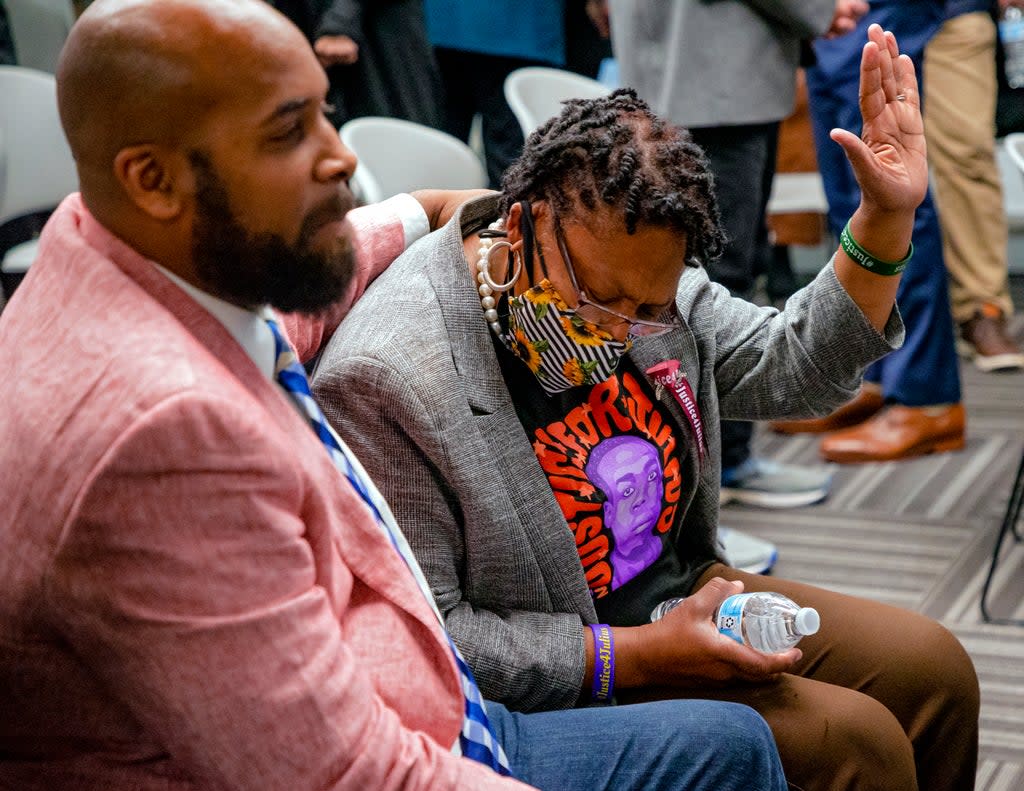Death row inmate Julius Jones is a perfect example of Oklahoma’s broken justice system

Oklahoma’s Pardon and Parole Board is to be applauded for recommending clemency for Julius Jones, but the fight is not over. The Board voted 3-1 today to commute Julius Jones’ death sentence to life with the possibility of parole. Jones has served 22 years and would be eligible for parole immediately.
Governor Kevin Stitt still must approve the request, and he is free to commute the sentence to time served, which would mean the immediate release of Jones, or to life without the possibility of parole, or anywhere in between.
We do not know what to expect from Stitt. Two of the three members that he appointed to the Board, Adam Luck and Kelly Doyle, voted for clemency today. The third, Scott Williams, recused himself. Luck and Doyle also voted for clemency for John Marion Grant on October 5, but were in a 2-3 minority, and Grant was executed Thursday in Oklahoma’s first instance of capital punishment following a six-year moratorium because of botched executions. According to eyewitness accounts, Grant suffered 24 full-body convulsions and vomited repeatedly for ten minutes after the first drug, midazolam, was administered.
The new composition of the board gives us hope. Luck and Doyle have backgrounds in criminal justice reform and working with the homeless, as well as prisoner re-entry. Larry Morris, who also voted for clemency for Jones, has a background as a juvenile counselor and social worker. In the past, the board has been dominated by former prosecutors and judges, who rarely recommended clemency. Indeed, it has recommended clemency only three times in the last ten years, and all three requests were rejected by then-Governor Mary Fallin. The last time a governor commuted a death sentence was in 2010.
The criminal justice system in Oklahoma is broken: The state leads the nation in executions per capita and is second in the nation in incarceration rate. And the Jones case is a good example of Oklahoma’s broken system. Bob Macy sent 54 people to death row in his 21 years as district attorney of Oklahoma County, the largest county in the state. Macy appeared at the crime scene the day after Paul Howell was shot and killed and announced that he would be seeking the death penalty. An arrest had not been made yet. All that Macy knew was that it was a Black-on-white crime in Edmond, Oklahoma, a prosperous, mostly white suburb of Oklahoma City.
Would the death penalty have been sought for Julius Jones if that crime had been committed in a less wealthy, less white suburb or in the inner city? A recent study showed that the death penalty was sought and obtained in only 3 percent of homicide cases in Oklahoma from 1988 through 2012. The death penalty is rarely but still arbitrarily imposed. It is supposed to be reserved for the worst of the worst, but too much discretion is left to prosecutors.
Jones’ plea for clemency was based entirely on his claim that he is innocent. Thirty other death-row inmates have exhausted their appeals and are eligible to have their executions scheduled. Only three or four of them have innocence claims. The others will be asking for mercy. Many of them have mental health issues and suffered from physical and sexual abuse as children.
If we set aside the issue of whether Jones is innocent, the state’s own evidence was that the gun pointed at Paul Howell “just went off”. That was the testimony of Chris Jordan, who pleaded guilty to participating in the murder. Does this qualify as the worst of the worst? A carjacking gone wrong and the gun just went off?
The prosecuting attorney made an extended argument during today’s hearing that Julius Jones was a gang member in the 1990s and that he had gang tattoos. These are racist dog-whistles.
We are cautiously hopeful that Stitt will approve the clemency request. He campaigned as a successful businessmen, and CEOs usually follow the recommendations of their boards.
Stitt has a chance to establish himself as a conservative who is willing to make real criminal justice reform. The Pardon and Parole Board appears to be willing to show mercy to death-row offenders. We can only hope that Stitt will support his board. That will be a good start toward rebuilding Oklahoma’s broken criminal justice system. If not, we are facing up to 30 executions in the next year.
Don Heath is chair of the Oklahoma Coalition to Abolish the Death Penalty. He is also the minister of a Disciples of Christ congregation in Edmond, Oklahoma.
Read More
Jess Phillips: Some days, I am scared about the abuse I face – mostly, I feel numb
Is the saga of the Squid Game crypto a warning of what is to come? | Hamish McRae
The west has to work with China over coal – hectoring is not the way | Vince Cable

